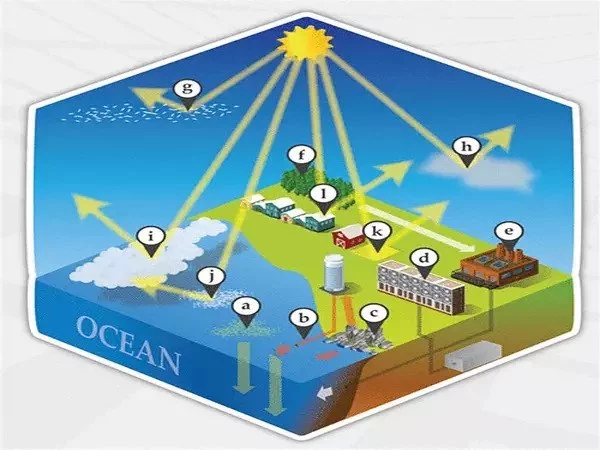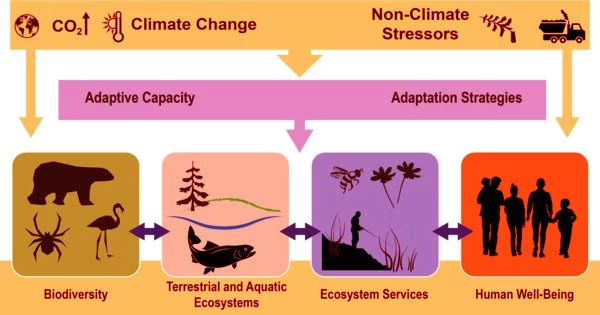Developing and providing access to the relevant information and tools required to meet these goals is one of the most difficult ongoing challenges in protecting and enhancing ecosystem resilience. Efforts are being made to collect data on the changes that are occurring and will occur in the future and to incorporate the data into research and analysis that will help us understand the possible outcomes for ecosystems.
According to new research published today in the journal Science, as the need to address climate change becomes more pressing, so does the need for proactive stewardship of the Earth’s rapidly changing biosphere.
“There is actually a lot we can do to help systems cope with oncoming climate change,” says Simon Fraser University biology professor and author Jonathan Moore, who reviewed and assessed the potential benefits of forward-thinking approaches with University of Washington professor Daniel Schindler. “Restoring connectivity, reducing local stressors, and conserving future habitats are all proactive approaches that can help the ecosystems on which we rely adapt to climate change.”
With this in mind, Schindler notes that it is critical to move beyond preservation-oriented approaches and include those that enable ecological change in order for species and ecosystems to adapt and be resilient. “Local efforts to conserve biodiversity and regenerate habitat complexity will also help species and ecosystems maintain a diversity of future options in an uncertain future.”
There is actually a lot we can do to help systems cope with oncoming climate change. Restoring connectivity, reducing local stressors, and conserving future habitats are all proactive approaches that can help the ecosystems on which we rely adapt to climate change.
Professor Simon Fraser
While the movement of species into new habitats has been critical to the biosphere’s adaptive response to a changing world, climate change is also transforming those ecosystems, resulting in the loss of some species and the addition of others.
The authors note that conservation should not just focus on “climate change losers” but also on proactive management of emerging opportunities and pressures. In the Arctic, warming oceans and shrinking sea ice may create more fish production but threaten some species like polar bears that rely on the ice for hunting seals. Ice loss in the Arctic Ocean also increases pressures from industrial activities such as shipping traffic and oil and gas exploration that pose environmental risks. These pressures need to be managed in a forward-looking approach to steward the Arctic ecosystem into the future.

The Earth’s biodiversity has a history of change, with genes, species, populations, and ecosystems all shifting fluidly with a changing world. “Earth’s systems have incredible capacity to adapt and be resilient to changes,” says Moore. “That is what has allowed some species to persist for millions of years. But our actions are seriously undermining that adaptive capacity.”
To meet the demand for information, federal agencies have established a number of networks of science and data providers, created a variety of climate tools and services, and introduced numerous innovations in modeling and prediction. However, the federal government cannot address all of the consequences of climate change on our natural resources on its own.
Addressing climate change and enhancing the resilience of our natural resources will necessitate the use of the entire nation’s skills, tools, and innovations. Improving collaboration and strengthening the ability of all parties to bring resources to the table to help the nation sustain and restore its natural resources will be required to foster this level of innovation and adaptive capacity to address changes.
The authors caution that even with the most aggressive emission reduction strategies further warming will “persist for decades” before potentially recovering, and strategies to enable adaptation and resilience will be key for maintaining functioning ecosystems and for conserving biodiversity.
“Natural resource management and conservation efforts will need to embrace the dynamic aspects of the biosphere to help maintain functioning ecosystems and protect biodiversity amid ongoing climate change,” says Moore.
According to Schindler, reducing greenhouse gas emissions is critical and urgent for humanity “The world is warming, and systems are changing as a result. We frequently expect ecosystems to look the same or for certain species to be found in the same places. The biosphere has never been static, and we must embrace management approaches that keep the biosphere dynamic and fluid. Thus, conservation and management must be both prospective (looking ahead) and proactive (taking action for the future).”
















